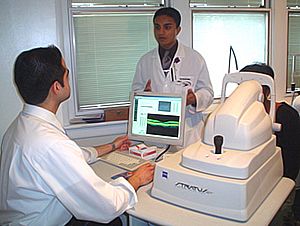The Department of Ophthalmology at the George Washington University School of Medicine and Health Sciences has made significant contributions in clinical research. Our research has been presented at several national and international meetings, and we are currently participating in several multi-center clinical trials.
Current Ongoing Research

Meibomian Gland Dysfunction Dry Eye Disease Clinical Trials
Preoperative iLux in Cataract Surgery Derived Dry Eye Disease Due to Meibomian Gland Dysfunction
The Systane iLux is an FDA approved device released in 2019 used to treat dry eye disease stemming from meibomian gland dysfunction (MGD). This clinical trial aims to assess the role of iLux treatment in treating post cataract dry eye disease (DED). Patients are randomly assigned into preoperative iLux treatment or no treatment (control group). The patient's meibomian gland functionality and tear film will be assessed at a baseline visit two weeks prior to cataract surgery and four weeks post cataract surgery. The outcomes investigated in this clinical trial were mean change in lipid layer thickness (LLT), MGD imaging atrophy through LipiViewII, Standard Patient Evaluation of Eye Dryness (SPEED) survey score, and Ocular Surface Index Score (OSDI). This study is sponsored by the Sigma Xi GIAR Vision Research Grant and the Gill Fellowship.
ClinicalTrials.gov ID: NCT06483750
Effect of Sunflower Lecithin Supplementation on Meibomian Gland Function in Adults with Dry Eye Disease
Lecithin’s are a group of essential phospholipids that are involved in numerous biological functions such as lipid-cholesterol transport, transmembrane signaling, and neurological function. Sunflower lecithin supplements are also a rich source of phosphatidyl choline, an essential nutrient for maintaining ocular function. Choline deficiencies have been implicated in a numerous ocular conditions including dry eye disease (DED). This study is a prospective interventional case series aimed at investigating the role of dietary lecithin supplementation in treating meibomian gland disorder (MGD) patients over the course of 3 months. MGD patients were subdivided into an active group (1,200mg oral lecithin QID) and a placebo group (olive oil). The outcomes analyzed in this clinical trial were mean change in Standard Patient Evaluation of Eye Dryness (SPEED) survey score, Tear break up time (TBUT), InflammaDry, and Meibomian Gland Dysfunction Assessment score from baseline to day 90 final assessment. This study is sponsored by the Virginia Lions Eye Institute and the Gill Fellowship.
ClinicalTrials.gov ID: NCT06058559
Contact Info
- sinanakosman97 [at] gmail [dot] com (sinanakosman97[at]gmail[dot]com)
- arnold [dot] leigh [at] gwu [dot] edu (arnold[dot]leigh[at]gwu[dot]edu)
Principal Investigator
- Dr. Keith Wroblewski